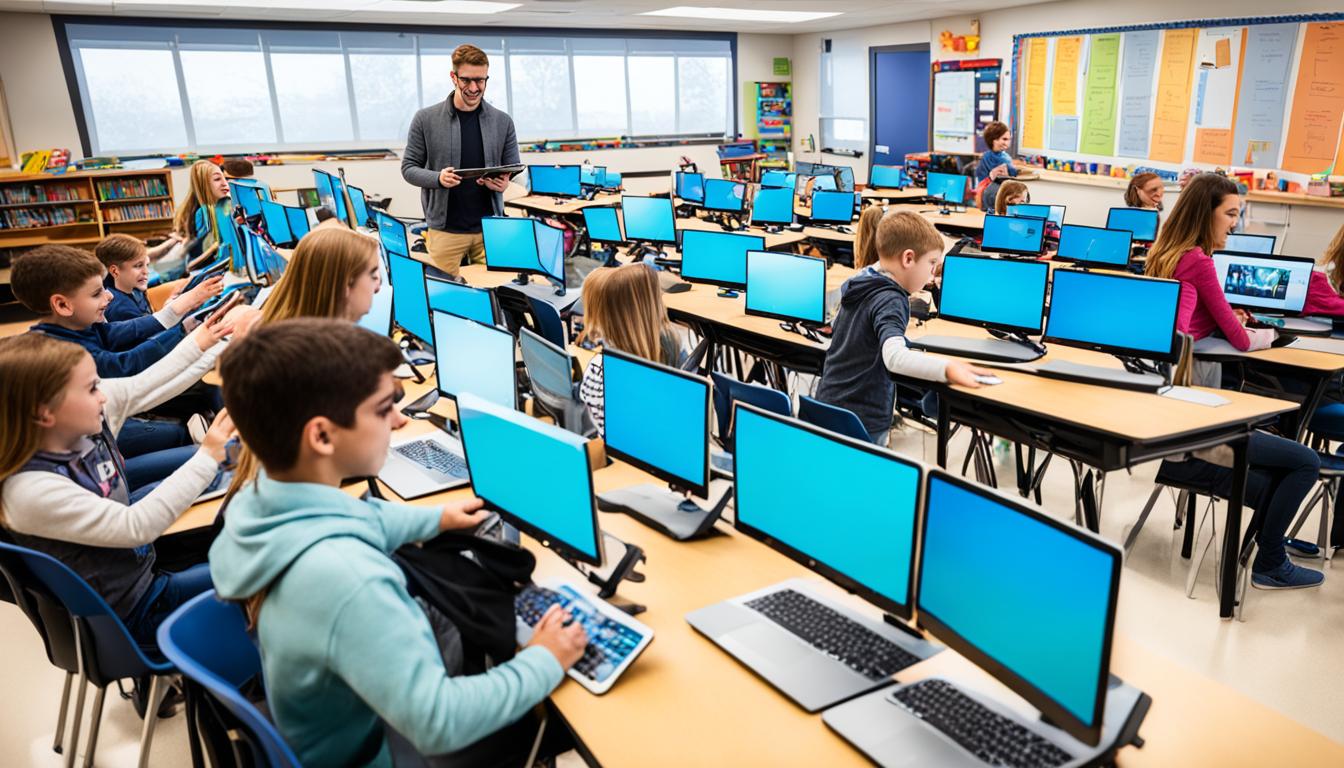Innovative Strategies for Enhancing Modern Technology Education in Today's Learning Atmospheres
Cutting-edge strategies, such as hands-on discovering experiences and joint project-based initiatives, play a critical function in connecting academic principles with sensible applications. As we explore these approaches, it becomes vital to consider exactly how tailored discovering can better enrich the educational experience and promote a deeper connection in between pupils and modern technology.
Hands-On Understanding Experiences
Hands-on knowing experiences work as a cornerstone in technology education and learning, effectively bridging the gap between academic understanding and sensible application. These experiential tasks allow pupils to engage straight with devices, software application, and innovation, cultivating a deeper understanding of principles that are often abstract in standard class setups.
By including hands-on understanding, teachers can promote an environment where students can experiment, introduce, and troubleshoot. This strategy not just grows technological skills yet likewise enhances analytic capabilities, as pupils are motivated to face real-world difficulties. Hands-on experiences commonly lead to raised student inspiration and involvement, as learners see the immediate importance of their researches to sensible circumstances.
Additionally, such experiences can take different kinds, including lab experiments, simulations, and interactive tasks, every one of which provide to different knowing designs. The combination of hands-on learning in modern technology education additionally promotes retention of details, as students are more probable to keep in mind ideas they have proactively worked with instead of passively observed. On the whole, hands-on experiences are essential in preparing pupils for the intricacies of the contemporary technological landscape, outfitting them with the skills and confidence needed to be successful in their future careers.
Collective Project-Based Discovering
Collective project-based knowing equips pupils to interact in teams to attend to complicated, real-world issues, fostering crucial skills for the contemporary labor force. This technique encourages energetic engagement, essential reasoning, and creative thinking, as students work out roles, share obligations, and collectively create solutions. By immersing themselves in jobs that show genuine challenges, students develop a much deeper understanding of the topic while refining their ability to interact and collaborate properly.
In modern technology education, collective project-based learning can show up with interdisciplinary projects that incorporate elements of layout, design, and coding. Trainees might team up to create a mobile application or layout a prototype that attends to a societal issue, requiring them to integrate various technological ideas and devices. This experiential understanding not only improves technical efficiency yet also grows analytic abilities and adaptability.
Additionally, such collective ventures promote a feeling of neighborhood among students, cultivating social relationships and a common dedication to their project end results. As they navigate the complexities of synergy, students discover to value diverse point of views and leverage each other's toughness, preparing them for future specialist settings where cooperation is crucial. Inevitably, collective project-based learning is a cornerstone of reliable innovation education and learning.
Assimilation of Online Resources

The assimilation of online sources assists in access to current info and industry requirements, which is vital in a quickly developing technological landscape. By leveraging systems such as MOOCs (Massive Open Online Courses) and specialized instructional sites, teachers can supplement typical educational programs with real-world applications, making it possible for pupils to involve with current patterns and try these out techniques.

Eventually, the thoughtful integration of on-line sources in innovation education promotes a much more vibrant, engaging, and pertinent discovering experience, furnishing trainees with the abilities and knowledge required to prosper in a significantly digital world.
Gamification Methods in Education
The consolidation of gamification methods in education stands for a powerful strategy to better engage trainees and boost their discovering experiences. By integrating game-like aspects such as points, badges, and leaderboards right into the educational program, teachers can stimulate inspiration and promote a sense of competition among students. These techniques urge participation and persistence, especially in topics that might or else show up discouraging.
Gamification can take various forms, including interactive quizzes, collective projects, and immersive simulations, which allow pupils to apply their expertise in functional contexts. This interactive strategy not just makes learning enjoyable but also enhances key ideas via repetition and instant comments. As pupils development, they can track their success, advertising a growth frame of mind and a sense of success.
In addition, gamification facilitates distinguished guideline by check my reference providing to diverse learning styles and speeds. Students are equipped to take ownership of their learning journey, enabling a much more personalized educational experience. In a progressively electronic world, using gamification methods can connect the void in between standard education and learning and modern technical advancements, ultimately preparing pupils for future challenges.
Personalized Knowing Approaches
Individualized discovering techniques are increasingly identified as important for dealing with the varied demands and choices of pupils in today's instructional landscape. These approaches empower students by customizing academic experiences to specific passions, strengths, and discovering rates, thus boosting engagement and retention.
In modern technology education, personalized knowing can take different types, including adaptive discovering innovations, customized educational programs, and project-based learning customized to pupil passions. Platforms that make use of synthetic knowledge can evaluate a pupil's efficiency data to recommend details resources or tasks that line up with their learning design.
In addition, tailored knowing urges trainee agency, enabling students to set objectives and select paths that resonate with their desires (Education). This freedom fosters a deeper link to the material, ultimately leading to enhanced end results
Educators play a critical role in this process, using developmental evaluations to monitor development and readjust instruction as necessary. Digital profiles and collaborative tools can additionally facilitate personalized discovering, permitting students to review their trips and showcase their accomplishments.
Verdict
Finally, enhancing innovation education and why not look here learning in modern learning environments requires the application of cutting-edge strategies that prioritize hands-on knowing, collective jobs, and the assimilation of on-line resources. Gamification techniques serve to enhance engagement and motivation, while customized knowing techniques fit specific toughness and foster pupil firm. Jointly, these approaches develop a vibrant instructional experience that prepares pupils for real-world challenges and cultivates vital skills for future success in a quickly developing technical landscape.
As we explore these methodologies, it becomes necessary to take into consideration just how individualized discovering can additionally enhance the academic experience and foster a deeper link in between trainees and innovation. The combination of hands-on discovering in technology education additionally advertises retention of info, as students are more most likely to keep in mind concepts they have actually proactively worked with instead than passively observed.The consolidation of gamification methods in education stands for an effective method to further involve trainees and enhance their discovering experiences. Trainees are empowered to take possession of their knowing trip, enabling for a much more customized instructional experience.In final thought, enhancing innovation education in modern knowing settings necessitates the execution of ingenious approaches that prioritize hands-on understanding, joint projects, and the assimilation of on the internet sources.